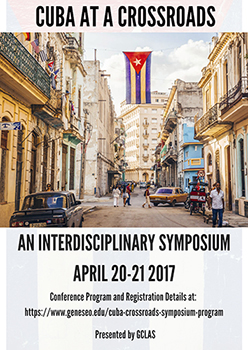
Speakers from Cuba and experts on the ever-changing country are on campus April 20 and 21 for an interdisciplinary symposium on contemporary Cuba.
“Cuba At a Crossroads” focuses on the transition the country and its people are making as diplomatic relations with the United States re-opened in 2015, and the ramifications of political and economic shifts in daily life, cultural and religious traditions, artistic production, civil society and professions.
Speakers, films and sessions explore 20th– and 21st-century Cuban realities from across all disciplines, and will bring faculty, advocates and others from across the country and region.
A screening of “Adios Patria? The Cuban Exodus” launches programming Thursday, April 20, at 7:30 p.m. at the Riviera Theater, with a discussion to follow with filmmaker Amy Serrano.
Friday’s highlights include a keynote address by Rafael M. Hernandez, of Havana. He is a political scientist, researcher and editor of a Cuban quarterly and a form er professor at the University of Havana. There are also sessions on nature and sustainability, Afro-Cuban religion, gender in contemporary Cuba, tourism, and several sessions with invited speakers who are experts in Cuban history and culture.
er professor at the University of Havana. There are also sessions on nature and sustainability, Afro-Cuban religion, gender in contemporary Cuba, tourism, and several sessions with invited speakers who are experts in Cuban history and culture.
The full program is online, as well as background information. All Geneseo students, faculty and community members are welcome to attend the film screening on the 20th and the panels/keynote/roundtables on the 21st for free without registration. Attending conference meals and receptions requires registration.
The conference was coordinated by Assistant Professor of Anthropology Melanie Medeiros with the support of the Geneseo Consortium on Latin American Studies, which includes Medeiros, Assistant Professor of International Relations Karleen West, Assistant Professor of History Ryan Jones, Assistant Professor of Anthropology Jennifer Guzmán, and Assistant Professor of Spanish Kyle Matthews. The symposium was also funded in part by a SUNY Conversations in the Discipline Grant.
Related Stories
No post found!
